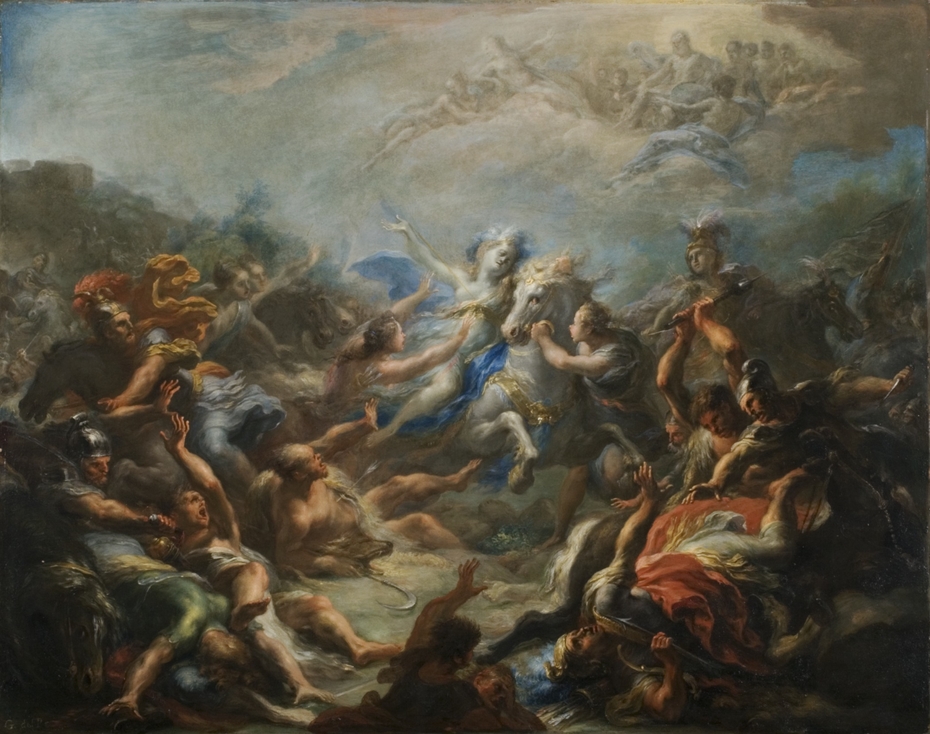Monday
When I wrote last Monday’s post about Aeneas plowing his way through women, I hadn’t yet finished the work and so hadn’t encountered the one woman who literally fights back. To be sure, Camilla doesn’t succeed, which may disappoint those opposing Brett Kavanaugh. But unfortunately, it fits our objective circumstances: as long as the GOP holds the presidency, women fighting to preserve reproductive rights are not going to win Supreme Court battles. Regardless of what happens with Kavanaugh, there are 50+ senators willing to push through nominees who will reverse Roe v Wade. A heroic martyr, then, is probably the best we can hope for at the moment.
Camilla is saved from an early death when, as a baby, she is attached to a spear and thrown across a river by her fugitive father, who then swims across to escape his pursuers and retrieves her. Once they find safe haven, he raises her to stand strong on her own:
When she could stand
And toddle a little he armed her with a javelin,
A tiny pointed lance, and over her shoulder
Hung quiver and bow. There were no golden brooches
To bind her hair, no trailing gowns: her dress
Was black and orange tiger-skin. Her hand
Grew used to tossing childish darts; or whirling
The limber sling around her head she learned
To hit her targets, crane or snowy swan.
And as she grew, many a Tuscan mother
Wanted her for this son, or that, but vainly:
Diana was her goddess, and she cherished,
Intact, an everlasting love—her weapons,
Her maidenhood, were all she knew and cared for.
When she grows up, she becomes an important military asset against the Trojan invaders:
And last of all
Camilla rode, leading her troops on horseback,
Her columns bright with bronze, a soldieress,
A woman whose hands were never trained to weaving,
to the use of wool, to basketry, a girl
As tough in war as any, in speed afoot
Swifter than wind.
As in the first half of the Ford-Kavanaugh hearing, the battle initially goes the woman’s way. Here’s one example that sounds like it could have appeared in the movie Black Panther:
Far off she saw the huntsman Ornytus
Riding a native pony, in stranger armor.
He wore a steer’s hide over his wide shoulders,
A wolf’s head for a helmet, with the jaws,
Wide-open, grinning above his head; he carried
A rustic kind of pike, and he was taller,
By a full head, than all the others, easy
Target for any dart. She cried above him:–
“What did you think, O Tuscan?—You were chasing
Beasts in the woods? The day has come when boasting
Like yours is answered by a woman’s weapons…”
Ultimately Camilla is taken down by subterfuge: Arruns stalks her rather than confronting her in a direct fight and then skulks off. No doubt the GOP will try to make it up with women voters once they ride down their opposition, pretending this has not been all about male entitlement and reinstating abortion restrictions:
And Arruns, fightened more than any other,
Half joy, half fear, makes off: no further daring
Is his, to trust the lance or face encounter.
As a wolf that kills a bullock or a shepherd
Before the darts can reach him, down the mountains
Goes plunging through the brush, the sign of guilt
His tail clapped under the belly, bent on flight,
So Arruns sneaks to cover through the armies.
Once Camilla is killed, the field is open for the Trojans. We have yet to determine whether still more GOP subterfuge awaits the Kavanaugh affair—will the FBI be genuinely open or hedged about by special protections?—but in Virgil’s epic, there’s no question. The outcome is pre-decided.
After all, this is the Aeneid, not the Camilliad. The men are still in charge.


